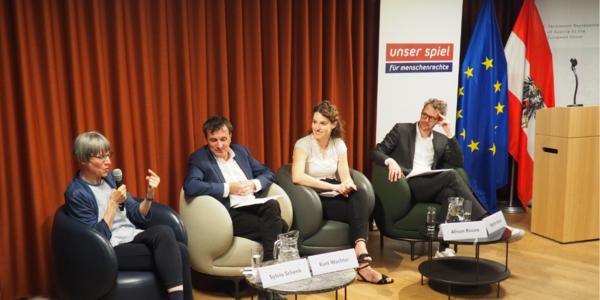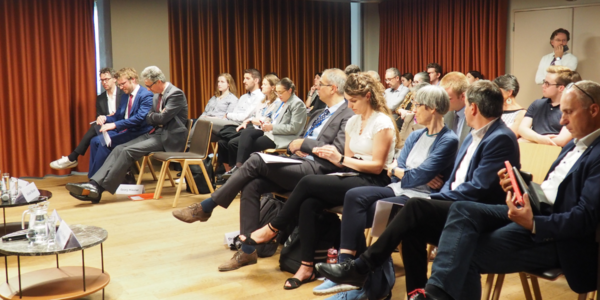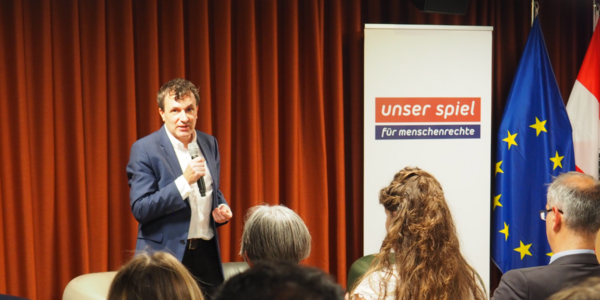Human Rights and International Sporting Events – Possible Ways Forward after Qatar
For many last years’ FIFA World Cup 2022 has been one of the most controversial sporting events in history. Following allegations of corruption when Qatar was awarded with the hosting right in 2010, Qatar was heavily criticized for exploiting migrant workers including female domestic workers, to discriminate LGBTIQ by law and restricting the freedom of speech.
Almost six months after final whistle, on 31 May 2023 a public panel discussion event at the Permanent Representation of Austria to the EU in Brussels discussed the burning theme of human rights violations at international mega-sport and possible how to move forward. The goal was to stimulate transfer of expertise as well as targeted and joint further action.
Nikolaus Marschik, Permanent Representative of Austria to the EU welcomed an audience of more than 60 participants made up of representatives of member states and civil society stakeholders. The ambassador said:
"It is about enhancing the bond between Europe, human rights, and sports. One of the objectives of the EU is to foster the European aspect of sports, emphasizing fairness and openness. In the realm of sports, inclusive efforts can have a profound impact in tackling racism and discrimination. Following the European Year of Youth 2022, particular attention can be directed towards the youth sector, as well as sporting events and competitions."
Drahoslav Stefanek, Chair of the Working Party on Human Rights (COHOM) from the European External Action Service (EEAS) reiterated that “human rights, the right to life is the most precious thing”. He told that in January 2021 the EU sport ministers led by Finland submitted a letter to the Commission asking the EU “to promote human rights in sport and major sporting events both within and outside of the EU”.
Georg Häusler, Director for Culture, Creativity and Sport at the European Commission contextualized the challenges in the field of Human Rights and Sport with retrospective insights. He reiterated "to practice sport is a human right, sport and human rights are intertwined, with Article 10 of the European Sports Charter affirming sport as a fundamental human right, so there is a direct connection between the two."
Panel discussion – Responsibilities and Learning from Qatar 2022
This was followed by a vivid panel discussion, led by Kurt Wachter (VIDC-fairplay), debating the legacy of the FIFA World Cup in Qatar, future allocations of major sporting events and the participation of Russian and Belarusian athletes at the Olympic and paralympic Games in Paris.
Sylvia Schenk, a member of the IOC Advisory Committee on Human Rights and former Olympic athlete was at the World Cup in Qatar as a FIFA Human Rights volunteer. She said:
“When I went to Qatar, I was afraid that I might be disappointed. I had the feeling, especially in Germany, that there was only black and white. I learned since working on human rights for 12 years and coming from sport that it's a very complex issue, it's never black and white.
There are many, steps in between if you want to progress, you cannot just follow your emotions. You cannot just follow any moral compass, you need rights, you need a legal view and you need a political view. And you have to see what's the first step and what might follow. Qatar has a lot of issues with human rights, but other countries have issues too."
Alison Biscoe, Head of Partnerships and Programme Development at the Center for Sport and Human Rights (CSHR) has been involved in setting up the Centre in Geneva as a multi stakeholder initiative in 2018. She said:
“Over the past five years, one of the biggest changes was that people recognise that human rights this is an issue in sport, ironically the Qatar World Cup helped a lot with that.
As Sylvia pointed out, Qatar is by no means the only event with human rights issues. At the centre we tried to develop an ecosystem approach. Each of the different stakeholders, whether that's governments, sport bodies, corporates or whoever, they all have different roles and responsibilities. But it's all about who's at the centre of that ecosystem, that’s the people who are potentially harmed. This could athletes, but also local communities who host events, workers, journalists, fans, officials or coaches, all can be harmed or affected negatively but also positively by sport.
A key development was the integration of human rights in the bid requirements. Next year, 2024, we'll see Paris, the Olympics and also the UEFA EURO in Germany, both of these events are the first time that human rights are being implemented in those respective events”.
Asked about the translation of the international human rights in sport discourse to the national level and the question what national sport stakeholders can do to promote fundamental rights Martin Kainz, author of the handbook “International Sporting Events and Human Rights – A Handbook for Implementation in Austria” said:
“In Austria, the push for human rights in major sporting events began around 2013 when civil society organizations advocated for respecting human rights, notably during the 2014 World Cup and 2016 Rio Olympics. These events highlighted human rights violations and spurred awareness about the responsibilities of international sporting bodies. Collaborating with the Austrian Ministry of Sports, we formed a Working Group on Sports and Human Rights.
This group aimed to address national human rights concerns and enhance the influence of Austrian sporting bodies within international federations. Initially starting with six major federations, they focused on raising awareness, shaping opinions, and supporting advocacy within these bodies. The group, now comprising 20 organizations, tackles diverse issues, from handling athletes from Russia and Belarus to addressing women's rights in Iran and advocating for imprisoned sportspeople. Additionally, it addresses national concerns like promoting gender equality, child safeguarding, and eco-friendly procurement practices”.
Forthcoming mega-Sport Events: UEFA EURO 20024 and FIFA World Cup 2026
The discussion then then turned to forthcoming mega-sport event and what will be different compared to Qatar 2022. Kurt Wachter asked Sylvia Schenk about the upcoming human rights strategy for UEFA EURO 2024 in Germany, given her pivotal role in its development.
“I'm eager to share what's planned for next year, though our progress has been gradual. We initiated a stakeholder movement in 2016 after the Sport and Rights Alliance influenced UEFA to include human rights criteria in EURO 2024 bids. On the national level, engaging civil society, football fans, and organizations like Human Rights Watch, I encountered the need to bridge the gap between human rights discourse and public perceptions in Germany, a challenge I'm still addressing today”.
Regarding the preparations for the next 2026 FIFA World Cup Alison Biscoe (CSHR) stated
“a pivotal step includes embedding human rights from the bid stage, necessitating a risk assessment by bidding countries and eventual host cities. This unique approach led to individual human rights plans by each host city, considering diverse laws in the US and Canada. Assessments highlighted strengths, gaps, and issued city-specific recommendations, notably focusing on child rights and engagement, a novel and proactive initiative for the event's preparation”.
Referring to the key question about responsibilities to ensure human rights, Martin Kainz reiterated.
“Major international sporting bodies hold responsibility amid serious issues like FIFA's controversies. Assigning events based on bid money should shift to favour those with better human rights records. Every country should have the chance to bid, but emphasis must be on nations already excelling in human rights. However, future events in countries with significant human rights challenges, like Saudi Arabia, raise questions about how they'll handle issues like worker exploitation or gender equality in sports spectating. This trend of awarding events to wealthy bidders over human rights standings needs urgent reconsideration”.
Autonomy of Sport and Controversy over Russian and Belarussian athletes
Following the inputs from the podium, the discussion was opened to the floor. Immediately questions about the autonomy of the sport movement vis a vis governments and the question if Russian and Belarussian athletes should participate the Olympic and Paralympic Games in Paris 2024 were raised.
Sylvia Schenk who participated for West Germany in the 1972 Olympic Games in Munich stressed the importance of international cooperation and multi-stakeholder involvement. Acknowledging the geopolitical complexities, she noted the IOC's challenge in navigating differing opinions on Russian and Belarusian athlete participation. Referencing historical debates on Olympic boycotts namely Moscow 1980, Sylvia Schenk cautioned against external interference, advocating for sports' role in civil society strength. She urged against governmental influence on international sports events, emphasizing the need to let situations evolve naturally.
In a critical view on the participation of Russian and Belarusian athletes in Paris 2024, Martin Kainz expressed uncertainty about the clarity of sports autonomy. While acknowledging its benefits, he insisted that sports autonomy must align with human rights. Kainz argued that if human rights are violated, states and EU members have an obligation to intervene, emphasizing the need for both national and international organizations to respect and protect human rights. He noted the complexity, especially in the context of Russia's actions, suggesting that athlete rights might be violated by restricting their participation. Kainz mentioned recent suggestions allowing certain athletes who do not actively support the war or be contracted by the military - but not the Russian flag - at the Olympics.
Alison Biscoe also questions the autonomy of sport in case of human rights violations, she said:
“Autonomy doesn't absolve accountability, especially in the context of human rights. The core principle is to ‘do no harm’, creating complexity in decisions about Russian and Belarusian athletes. Requirements, like opposing the war, may subject athletes to regime pressure. The key for the IOC and International Federations should be ensuring no harm will come to Russian or Ukrainian or any other athlete by the policies that you put in place. And it's not just about governments interfering; true accountability involves navigating these complexities”.
Synopsis: How to advance the sport and human rights agenda?
To sum up, the public event in Brussels gathered more then 60 public and civil society stakeholders as well as representatives of EU member states to exchange views on the promotion of human rights in the context of major sporting events and to identify best practices and envisage possible next steps following the controversial FIFA World Cup in Qatar.
The panel discussion itself was characterized by the distinguished panelists and their diverse perspectives. It shed light on various human rights aspects, with a primary focus on discussing the responsibility of different institutional actors to establish regulations and frameworks that promote the monitoring and enforcement of human rights, as well as exploring potential ways to shape sport events in a sustainable and human rights-oriented manner. Thus, the event helped in raising awareness of human rights issues related to international sporting events and discussing potential solutions among policy stakeholders.
"I always continue to learn during discussions on the complex topic of human rights, and the international exchange at the Austrian Permanent Representation was very exciting," reflected Sylvia Schenk on the event.
The event was organized by the fairplay initiative at the Vienna Institute for International Dialogue and Cooperation (VIDC) as part of the project Our Game for Human Rights, www.ourgame.at, with the support of the Austrian Development Agency (ADA) and the Austrian Sports Ministry (BMKOS), who was represented through the Head of Department, Dieter Brosz.
Special thanks are due to the Permanent Representation of Austria to the EU, particularly Ambassador Nikolaus Marschik, Felix Hauer, and Kimberley Baeyens, who served as hosts of the event and provided indispensable support.





